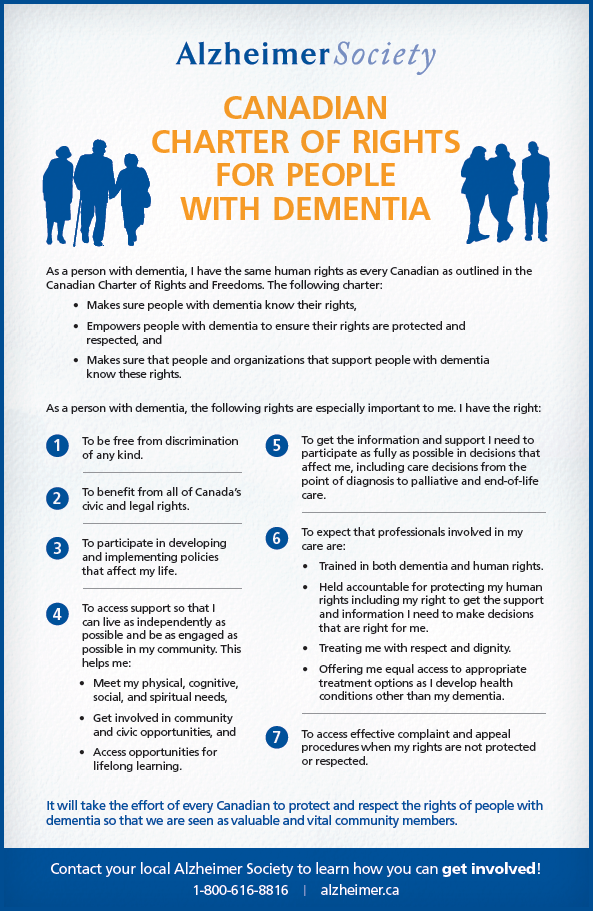The Canadian Charter of Rights for People with Dementia
As a person living with dementia, the Charter can help you stand up for your rights. These include the rights to live free of stigma, participate in policies that affect you, and more.
What is the Charter?
People living with dementia deserve the same human rights as any other person in Canada, as outlined in the Canadian Charter of Rights and Freedoms. However, stigma and discrimination are huge challenges for people living with dementia and often violate these rights.
That’s why the Alzheimer Society is pleased to support the first-ever Canadian Charter of Rights for People with Dementia. The Charter is the result of work by the National Advisory Group of People with Lived Experience of Dementia, whose members come from many different backgrounds and experiences.
The Charter defines seven explicit rights. The Charter can empower you to stand up for yourself as a person living with dementia in Canada. It also ensures that the people and organizations that support you will know and protect your rights.
Read the Charter
"As a person with dementia, I have the same human rights as every Canadian as outlined in the Canadian Charter of Rights and Freedoms.
The following charter:
- Makes sure people with dementia know their rights,
- Empowers people with dementia to ensure their rights are protected and respected, and
- Makes sure that people and organizations that support people with dementia know these rights.
As a person with dementia, the following rights are especially important to me. I have the right:
- To be free from discrimination of any kind.
- To benefit from all of Canada’s civic and legal rights.
- To participate in developing and implementing policies that affect my life.
- To access support so that I can live as independently as possible and be as engaged as possible in my community. This helps me:
- Meet my physical, cognitive, social, and spiritual needs,
- Get involved in community and civic opportunities, and
- Access opportunities for lifelong learning.
- To get the information and support I need to participate as fully as possible in decisions that affect me, including care decisions from the point of diagnosis to palliative and end-of-life care.
- To expect that professionals involved in my care are:
- Trained in both dementia and human rights.
- Held accountable for protecting my human rights including my right to get the support and information I need to make decisions that are right for me.
- Treating me with respect and dignity.
- Offering me equal access to appropriate treatment options as I develop health conditions other than my dementia.
- To access effective complaint and appeal procedures when my rights are not protected or respected.
It will take the effort of every Canadian to protect and respect the rights of people with dementia so that we are seen as valuable and vital community members."
Download the Canadian Charter of Rights for People with Dementia in print-friendly PDF.
Interested in getting a print copy of the Charter sent to you? Contact your local Alzheimer Society.

How the Charter came to be
The importance of human rights for people living with dementia
People living with dementia have the same human rights as anyone else, including the right to manage their own lives. Over time, however, dementia may affect their abilities to make decisions about everyday life, such as financial and health decisions.
This means that people living with dementia are vulnerable to assumptions, actions and decisions made on their behalf. As a result, it may be difficult for people living with dementia to stand up for themselves when their rights are threatened. People living with dementia also often face stigma and discrimination based on their diagnosis.
A human rights-based approach to dementia can help address this problem and give people with dementia a voice.
What is a human rights-based approach to dementia?
A human rights-based approach means that both individuals and the wider community acknowledge the rights of the person living with dementia. This empowers the person living with dementia and improves their quality of life. Through this approach, people living with dementia should be able to:
- Receive support to assist with developing policies, resources and care approaches about dementia
- Know and claim their rights, especially when they feel their rights are being threatened
- Hold individuals and organizations responsible for respecting and protecting their rights
- Know that health, social care and civic services will understand their needs and provide the highest possible quality of care and support
With this approach in mind, the Advisory Group of People with Lived Experience of Dementia worked with the Alzheimer Society of Canada to create the Canadian Charter of Rights for People with Dementia.
Read the stories behind the Charter
We asked the members of our Advisory Group to share what the Canadian Charter of Rights for People with Dementia means to them. These are their stories.
"When it comes to society’s perception of dementia, as well as respecting and appreciating an individual with dementia’s right and ability to participate fully in all of what life has to offer, we still have ways to go." - Jim Mann, British Columbia
"I don’t hide that I have Alzheimer’s, but it’s my choice when and how to talk about it. Our Charter of Rights is a reminder for me, and those who interact with me, that I am still here, and I am still a person." - Marilyn Taylor, Nova Scotia
"By sharing our experiences, we can enrich the lives of others and encourage networks of sensitive and caring people." - Mario Gregorio, British Columbia
"We, as citizens in this great country, have a responsibility to live within and uphold this framework for rights that we hold so dear to our hearts as Canadians." - Roger Marple, Alberta
What can the Charter be used for?
The Charter protects and asserts your rights as a person living with dementia in Canada.
- The main purpose of the Charter is to help you understand your rights and stand up for them.
- The Charter can also help policymakers, health and social services, and other government agencies to take proper action to improve the lives of those living with dementia and caregivers. For example, the Charter can inform the Dementia Strategy for Canada.
- Organizations whose work impacts people with dementia can use the Charter to ensure that people living with dementia receive the same high-quality services offered to others, enabling them to enjoy the best possible quality of life.
- Finally, the Charter is relevant to all people in Canada living with dementia. Like the Canadian Charter of Rights and Freedoms it is based on, the Canadian Charter of Rights for People with Dementia is inclusive and does not discriminate based on race, national or ethnic origin, colour, religion, sex, age or disability.
Why meaningful engagement matters

The Canadian Charter of Rights for People with Dementia was created with meaningful engagement of people who live with dementia like you.
Meaningful engagement occurs when people living with dementia are meaningfully involved in an initiative, actively contributing ideas, skills and abilities. In meaningful engagement, people living with dementia have their views and perspectives heard, and are able to influence policies, decisions and care approaches.
People with dementia remind us, “Nothing about us without us.” Lived experience and knowledge of dementia ensure that the Charter fully reflects your needs.
Talk about the Charter
The ability to participate in decisions that affect our lives is a fundamental human right. Alzheimer Societies across Canada are inviting people living with dementia to become involved in the Society’s work.
You've read what the members of our Advisory Group have to say. Now it's your turn: What do you think of the Canadian Charter of Rights for People with Dementia? We want to hear from you.
Tell us what you think at [email protected] or 1-800-616-8816.
More useful links and resources
The Canadian Charter of Rights for People with Dementia. Alzheimer Society of Canada.
Position statement: Meaningful engagement of people with dementia. Alzheimer Society of Canada. The Alzheimer Society of Canada recognizes that individuals living with dementia possess valuable insights that can significantly influence initiatives aimed at enhancing their quality of life and well-being. We advocate for their active involvement in shaping the services and supports that affect them. To learn more about our commitment to meaningful engagement, please read our complete statement.
Guide to the Canadian Charter of Rights and Freedoms. Government of Canada. This guide gives more detail on the landmark document for human rights in Canada, on which the Canadian Charter of Rights for People with Dementia is based.
A human rights based approach: An introduction. Scottish Human Rights Commission. Read more about what a human rights-based approach is, including the importance of the PANEL principles (Participation, Accountability, Non-Discrimination and Equality, Empowerment and Legality).
